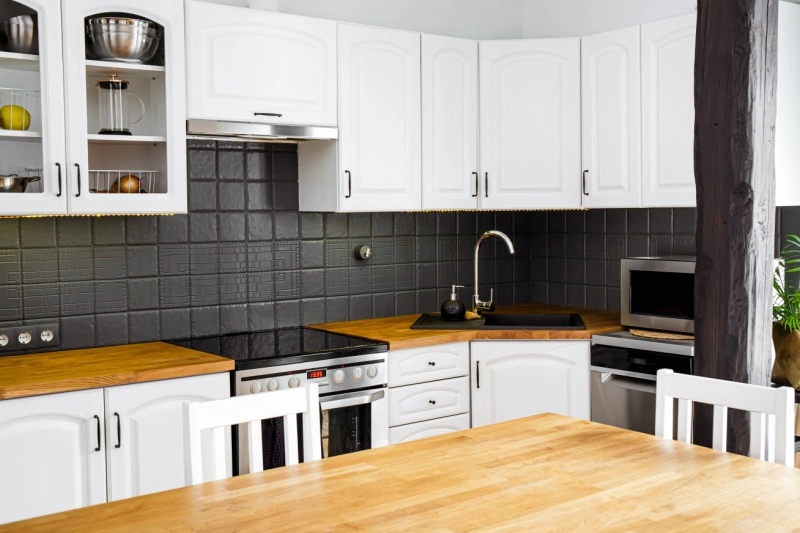
Butcher block countertops or boards are a beautiful and durable addition to any kitchen. One of the downsides of butcher block is the surface is much softer than other surfaces like Quartz or stone, which makes it more prone to scratching and damage.
If not cleaned regularly and properly, butcher block countertops can host dangerous bacteria. While it’s true that wood contains natural antimicrobial properties that help inhibit the growth of bacteria, it's still important to maintain good hygiene practices when it comes to your butcher block.
With that in mind, the cleaning experts at Molly Maid® have some simple steps that will help keep your your butcher block countertops or boards clean and free from bacterial growth:
- Clean spills quickly: Don’t let spills sit on your butcher block for long periods. Wipe up spills or messes as soon as they happen to prevent them from seeping into the wood and providing a breeding ground for bacteria.
- Regularly clean and disinfect: Follow the simple steps (outlined below) to clean and disinfect wood countertops regularly.
- Avoid chemicals: Do not use harsh chemicals like bleach or ammonia on your wood because it can cause damage by stripping away its natural protective properties. Stick to gentle cleaning solutions containing lemon juice or undiluted distilled white vinegar.
- Dry thoroughly: After cleaning, dry the wood countertop thoroughly to prevent moisture from lingering, as excess water can encourage bacterial growth.
- Apply a protective finish: Use a food-grade mineral oil or specialized wood conditioner to seal the wood and create a protective barrier against bacteria.
Table of Contents:
Gather Your Supplies
A butcher block should be cleaned after every use to prevent bacteria buildup. Frequently used butcher blocks should be resealed with food-grade mineral oil monthly.
Here is what you need to properly clean your butcher block on a regular basis:
Tools:
- Microfiber cloths
- Plastic scraper
- Sponge
- Spray bottle
Materials:
- Distilled white vinegar
- Dishwashing liquid
- Salt
- Lemon juice
- Plastic food wrap
- Food-safe mineral oil
Step 1: Scrub the Countertop
When cleaning a butcher block, start by wiping the surface with a damp cloth or sponge to remove any loose debris or crumbs. You may need to use a plastic scraper if there are food particles stuck on the surface of your butcher block.
Step 2: Apply the White Vinegar
White vinegar is an excellent natural cleaning agent for butcher block countertops because it has antimicrobial properties that can kill bacteria and germs on the surface of the wood. Here's how you can use white vinegar to clean your butcher block:
- Prepare vinegar: Pour white vinegar into a spray bottle or a small bowl. If using a bowl, have clean sponge or white cloth handy.
- Spray or apply the vinegar solution: Lightly spray the vinegar directly onto the surface of the butcher block or apply it using a clean cloth or sponge. Allow the vinegar to remain on the surface for about 10 minutes.
- Scrub gently: Use a non-abrasive sponge to scrub the vinegar solution into the wood and remove any dirt, stains, or bacteria.
- Rinse: After scrubbing, rinse the butcher block with water to remove any vinegar residue.
- Dry completely: Use a dry cloth or towel to dry the butcher block thoroughly. Ensure no moisture is left behind, as excess moisture can damage the wood.
Step 3: Apply Salt + Lemon Juice
Another natural cleaning option is a combination of sea or kosher salt and lemon juice. This solution is effective as both a cleaner and disinfectant. Apply this solution as follows:
- Sprinkle the counters or board with coarse salt, like sea or kosher salt. Cut a lemon in half and rub the lemon cut-side-down over the salt on the board in small circles, following the direction of the grain.
- Let the solution sink into the board for five minutes.
Step 4: Wipe Off the Salt
Rinse the countertop or board very well to ensure that the salt is removed, then dry it with a cloth or paper towel. Never store butcher block boards while they are still damp.
Additional Butcher Block Care Instructions
- Make sure you DON’T over-oil butcher block. Over-oiling can cause the wood fibers to prematurely break down.
- In rare instances, mineral oil will raise the grain of the wood slightly on new blocks, leaving an area that is rough to the touch. This is natural and NOT a defect of the wood. This can easily be fixed by lightly sanding the area and reapplying oil. Repeat the process as necessary until the block becomes smooth again.
- Always keep butcher blocks out of direct sunlight and do not allow water or other liquids to remain on the wood for long.
Have the Cleanest House on the Block
While butcher block countertops need special care to keep them clean and bacteria-free, so does the rest of your home. If you’re feeling overwhelmed at the prospect of keeping your butcher block countertops and the rest of your home clean, don’t worry; the pros at Molly Maid® are ready to help!
Whether you need a one-time, occasional, regular, or special event cleaning, our team is ready to help you get it all done. Molly Maid is the cleaning service thousands of homeowners trust to tackle the most challenging cleaning chores. And with our Neighborly Done Right Promise™, you have our commitment that all of our work will be done to your complete satisfaction!
Ready to request a free house cleaning estimate in your area? Contact your local Molly Maid today!
